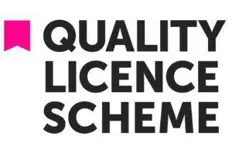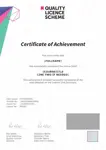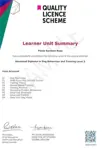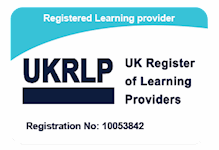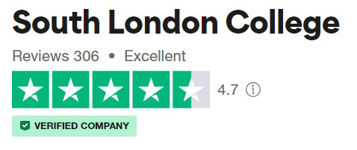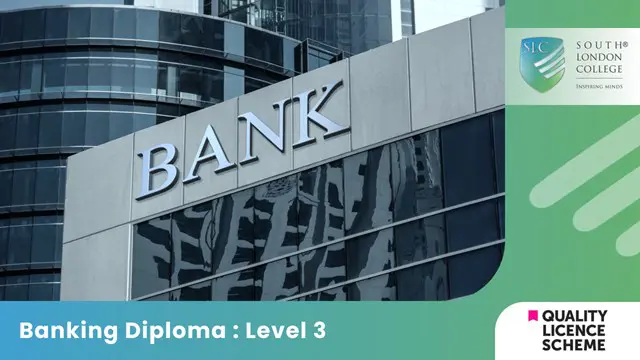
Banking Diploma : Level 3
Accredited by Quality License Scheme | Endorsed Certificate & Unit Summary
South London College
Summary
- Tutor is available to students
- TOTUM card available but not included in price What's this?
Overview
Diploma in Banking - Level 3
A career in banking is desired worldwide due its high pay, job reputation and many other associated job benefits. However, getting into this competitive industry requires you to have extensive knowledge and skills on banking, and this Diploma in Banking – Level 3 has been developed just to do that. This banking course will get you acquainted with all the necessary banking principles and concepts to help you advance your banking career or to help you expand your education in the area.
Starting with the essence of banking within an economy, this course will systematically guide you on the operations of a banking system. You will come to understand the role of banks in money creation, after which you will learn how to critically evaluate current and major practices of banking and finance. How to manipulate numerical and financial data and how to apply statistical and mathematical concepts within a banking context will also be thoroughly emphasised in this program.
Many types of banks operate within a given economy, with each bank having different customers and providing different banking services.. This course is set to explore all of these banking structures and its services, followed by modules that will discuss the principles and procedures of the business information systems. This course will also make you an expert in analyzing business activities and forecasting financial projections. By the completion of this course, you will walk away with an accredited certification that will help you make substantial progress within the banking industry.
The course has been endorsed under the Quality Licence Scheme. The completion of this course alone does not lead to a regulated qualification* but may be used as evidence of knowledge and skills gained. The Learner Unit Summary may be used as evidence towards Recognition of Prior Learning if you wish to progress your studies in this subject. To this end the learning outcomes of the course have been benchmarked at Level 3 against level descriptors published by Ofqual, to indicate the depth of study and level of demand/complexity involved in successful completion by the learner.
Eligible for TOTUM card - TOTUM is the #1 student discount card and app giving you access to exclusive student deals on food and fashion, tech and travel and everything in between.
*Regulated qualification refers to those qualifications that are regulated by Ofqual / CCEA / Qualification Wales
Achievement
Course media
Description
What Will I Learn?
- Gain a clear understanding of how major context within the banking industry operate.
- Learn how to critically evaluate current and major practices of banking and finance.
- Learn how to manipulate numerical and financial data, and the understanding and ability to apply statistical and mathematical concepts.
- Understand the principles and procedures of the business information systems.
- Learn how to analyse business activities and forecast financial projections.
- Gain an accredited qualification that will take your skills and knowledge to the next level.
COURSE CURRICULUM
Module 01 : Essence of Banking
- Essence of banking
- Introduction
- The financial system
- Introduction
- Lenders and borrowers
- Financial intermediaries
- Financial instruments
- Financial markets
- Money creation
- Price discovery
- Allied participants on the financial system
- Principles of banking
- Introduction
- Fundamental issues in banking
- Basic raison d’être for banks: information costs and liquidity
- Introduction
- Information costs
- Asymmetry in liquidity preference
- OTC versus securities markets
- Broad functions of banks
- Introduction
- Facilitation of flow of funds
- Efficient allocation of funds
- Assistance in price discovery
- Money creation
- Enhanced liquidity
- Price risk lessened for the ultimate lender
- Improved diversification
- Economies of scale
- Payments system
Module 02 : Money Creation
- Money creation
- Learning objectives
- Introduction
- What is money?
- Measures of money
- Monetary banking institutions
- Money and its role
- The cash reserve requirement
- Money creation does not start with a bank receiving a deposit
- Introduction
- Notes and coins deposited
- Government spends
- Money creation starts with a bank loan
- Money creation is not dependent on a cash reserve requirement
- Is “money supply” a misnomer?
- Interest
- Rate
Module 03 : Risk in Banking
- Risk in banking
- Learning outcomes
- Introduction
- The concept of risk
- Interest rate risk
- Definition
- Ideal and extreme portfolios
- Reality
- Management of interest rate risk
- Introduction
- Interest rate repricing gap analysis
- Duration analysis
- Market risk
- Liquidity risk
- Definition
- Balance sheet changes resulting from deposit withdrawals and drawdowns on loan facilities
- Conditions for creation of liquidity
- Introduction
- Impeccable record
- Volume of and the type of liquid assets
- Active secondary financial markets
- Measures of a bank’s liquidity exposure
- Bank liquidity and a “bank run”
- The central bank and the bank run
- Deposit insurance
- Credit risk
- Definition
- Asymmetric information, adverse selection and moral hazard
- Management of credit risk
- Introduction
- Avoidance
- Diversification
- Compensating balances and monitoring of business transactions
- Screening
- Monitoring
Module 04 : Bank Models
- Contents
- Bank models & prudential requirements
- Learning outcomes
- Introduction
- Bank models
- Introduction
- Commercial banks
- Mutual banks/building societies
- Merchant and investment banks
- Trading banks
- Private Banks
- Islamic banks
- Development banks
- Micro – credit banks
- Co – operative banks
- Dedicated banks
- Discount houses
- Rationale, objectives & principles of regulation
- Introduction
- Rationale for regulation
- Introduction
- Systemic malfunction
- Market imperfections
- The moral hazard problem
- Economies of scale
- Consumer confidence and consumer demand for regulation
- Supplier demand for regulation
- Objectives of regulation
- Introduction
- Promotion of financial stability
- Promotion of fair and healthy competition
- Promotion of consumer protection
- Principles of regulation
- Introduction
- Efficiency-related principles
- Stability-related principles
- Conflict-conciliatory principles
- Regulatory-structure principles
Module 05 : End Notes
- End notes
Access Duration
The course will be directly delivered to you, and you have 12 months access to the online learning platform from the date you joined the course. The course is self-paced and you can complete it in stages, revisiting the lectures at any time.
Method of Assessment
In order to complete the Diploma in Banking at QLS Level 3 successfully, all students are required to complete a series of assignments. The completed assignments must be submitted via the online portal. Your instructor will review and evaluate your work and provide your feedback based on how well you have completed your assignments.
Certification
Those who successfully complete the course will be issued the Diploma in Banking at QLS Level 3 by the Quality Licence Scheme.
Course Code: QLS-04478
Awarding body (Accreditation)
The Quality Licence Scheme is part of the Skills and Education Group, a charitable organisation that unites education and skills-orientated organisations that share similar values and objectives. With more than 100 years of collective experience, the Skills and Education Group’s strategic partnerships create opportunities to inform, influence and represent the wider education and skills sector.
The Skills and Education Group also includes two nationally recognised awarding organisations; Skills and Education Group Awards and Skills and Education Group Access. Through our awarding organisations we have developed a reputation for providing high-quality qualifications and assessments for the education and skills sector. We are committed to helping employers, organisations and learners cultivate the relevant skills for learning, skills for employment, and skills for life.
Our knowledge and experience of working within the awarding sector enables us to work with training providers, through the Quality Licence Scheme, to help them develop high-quality courses and/or training programmes for the non-regulated market.
Who is this course for?
- Financial Officer
- Accountant, Finance Managers
- Students studying Finance
Requirements
- Learners should be age 19 or over, and must have a basic understanding of Maths, English, and ICT.
- A qualification at level 2 or above in any discipline.
Career path
- Accountant - £28,612 per annum
- Banker - £24K per annum
- Relationship Banker - £29,703 per annum
- Accounts Executive - £22,196 per annum
- Staff Accountant - £25,261 per annum
Questions and answers
Hi, Do I need to go through Level 1& 2 courses? I did not find on Reed. I am a graduate in Accounting &Finance. Do I still need to do Level 1 & 2?
Answer:Dear Satya, Thank you for your query. You should have any recognised qualification at level 2 or above in any discipline. Regards, Student Support Team
This was helpful.I just finished the course since last November 2020. But I did not receive any certificate either in Digital format or Hard copy. May you assist me.
Answer:Dear Salamix, Thank you for your query. Your certificate has been returned and we still have not received it from the Royal Mail. We have already requested to re-issue the certificate as soon it arrives. Thank you for your patience with us and sorry for the inconvenience caused. Regards, Student Support Team
This was helpful.How much extra we have to pay for certificate
Answer:Dear Student, Thank you for your query. OPTION-I: Endorsed Certificate of Achievement from The Quality Licence Scheme (Printed and PDF format) You can claim the The Quality Licence Scheme Accredited Certificate issued in printed format along with a Free PDF format. It will include a Learner Unit Summary with a cost of only £49. OPTION-II: CPD Certificate (Digital format and hard copy) Digital format (PDF) will cost you £29. Printed Format will cost you £39 Regards, Student Support Team
This was helpful.
Reviews
Currently there are no reviews for this course. Be the first to leave a review.
Legal information
This course is advertised on reed.co.uk by the Course Provider, whose terms and conditions apply. Purchases are made directly from the Course Provider, and as such, content and materials are supplied by the Course Provider directly. Reed is acting as agent and not reseller in relation to this course. Reed's only responsibility is to facilitate your payment for the course. It is your responsibility to review and agree to the Course Provider's terms and conditions and satisfy yourself as to the suitability of the course you intend to purchase. Reed will not have any responsibility for the content of the course and/or associated materials.

